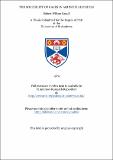The solubility of gases in aqueous alcohols
Abstract
Extensive measurements have been made of the solubilities of the five gases helium, hydrogen, argon, oxygen, and carbon dioxide, in ethanol/water and in t-butanol/water mixtures over the whole of their concentration range, and throughout the temperature interval 4°C to 61°C. The measurements were carried out by the less usual flowing-film technique, which has been described in detail. It depends on the rapid establishment of equilibrium between a gas and its solvent while the liquid flows in a stable, thin film down the walls of a tube enclosing the gas. Results were reproducible, corroborated at relevant points by results obtained by other workers from the other more common mixing techniques. These solubility measurements were used to investigate the effects of foreign molecules on the structure of liquid water. To this end standard thermodynamic functions were calculated for each of the solubilities, having programmed a computer to carry out the arithmetic. Graphs were drawn to show the relationship of the functions to the gas dissolved, the alcohol mixed with the water, and the temperature. Most information was obtained from the enthalpy and entropy changes in the systems, and certain features of their dependence on the concentration of the alcohol. A mixture model for water structure has been described, and some aspects of it elucidated. The size of any molecule introduced into water has been shown to be an important factor in its influence on the water structure. A quantitative estimate has been made of the effect of temperature on the mole fraction of water molecules which are completely hydrogen-bonded, called "icebergs" or "clusters". An estimate has also been made of the relative amounts of different-sized clusters at various temperatures, and it has been concluded that as the temperature rises, there is a selective and progressive destruction of the largest clusters. Finally, a mechanism has been suggested for the stabilisation of clusters by added solute molecules, which depends on their efficiency at preventing thermal disruption of the clusters.
Type
Thesis, PhD Doctor of Philosophy
Collections
Items in the St Andrews Research Repository are protected by copyright, with all rights reserved, unless otherwise indicated.

